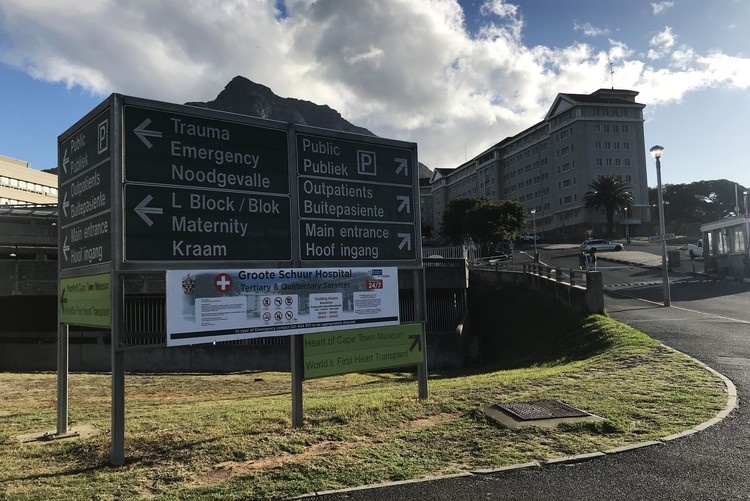GroundUp reported.
“I expect there will be an excess of patients needing care even if all existing beds are opened,” said a doctor who did not want to be named.
The hospital was currently running seven wards with more than 120 Covid-19 patients, and four intensive care units with 19 patients, one of several doctors at the hospital told GroundUp.
Three of these wards are for confirmed Covid-19 cases, others are for suspected cases – in other words people with respiratory illnesses. A doctor said the proportion of these patients testing positive was increasing rapidly.
“I would estimate around 60% at this point.”
These are not additional beds. They were created by shutting down other services. The Department of Medicine, which currently runs the Covid-19 services in the hospital, has added the 120 Covid-19 (or suspected Covid-19) beds to its existing beds (approximately 100). In other words, the department has doubled its workload.
“Additional capacity to absorb the expected number of Covid-19 patients will need to be created by collapsing other services to allocate beds and redeploy staff from surgical and other disciplines,” a doctor told GroundUp.
Doubling every five days
Another doctor told the publication the number of Covid-19 patients was doubling about every five days. He said a “surge of cases” was expected in the next few weeks and “a transparent and feasible plan” to develop more capacity in the healthcare system was urgent.
“This requires beds, oxygen, and importantly, staff, plus a triage system that can identify patients requiring hospital versus lower levels of care. The public could volunteer and be trained to support lower care Covid-19 facilities.”
Some doctors and nurses working hard, but others are not showing up
One doctor said nurses and doctors were working 12-hour shifts. Several doctors have tested positive, all with mild symptoms so far, and a larger number of other staff, including nurses and porters. Burnout is “starting to creep in” but there are a number of support services in place.
But some doctors and nurses are apparently not showing up for work or reluctant to work with Covid-19 patients. In a message to doctors, a senior hospital manager pleaded with them to make themselves available.



Groote Schuur Hospital in Cape Town has about 140 Covid-19 patients. (Photo: Ashraf Hendricks)
“My reason for writing to you tonight is to make a plea for your assistance and to request you to dig deep in asking yourselves why you became doctors in the first place. Each and every one of us now need to be truthful to our oath and to our profession.
“Some staff have volunteered to work in these wards; some have been told to work without any choice and then there are many who have not come to the fore as yet.”
What about non-Covid-19 patients?
When we asked a doctor if the number of non-Covid-19 patients had declined, he said it was difficult to estimate because for some patients with respiratory illnesses, which increase at this time of the year, it was not known if they have Covid-19 until their tests came back, which could take days.
“There are still between 15 to 20 direct non-Covid medical admissions a day, which is maybe slightly lower than the usual numbers,” the doctor added.
“We have seen data from the province showing that HIV and TB services have been affected with fewer antiretroviral treatment initiations and TB diagnoses in April compared to previous months.
“As primary care is diverted to dealing with Covid-19, there will be fewer referrals to hospitals for other conditions, although on the other hand, there may be a higher risk for underlying chronic conditions to deteriorate and more patients will require hospital care.”
Oxygen is key
While there are no approved drugs in South Africa to treat Covid-19 yet, one factor makes a difference: getting oxygen to sick people.
One doctor explained the majority of patients would either be on no oxygen or on low-flow oxygen via nasal prongs or a face mask.
“A sub-group of patients with respiratory failure require much higher concentrations of oxygen that can only be achieved by specialised high-flow nasal cannula devices or mechanical ventilation.
“Because the outcomes with invasive mechanical ventilation [intubation] are so poor, we are supporting patients with non-invasive methods for as long as we can, and only intubate when these strategies fail.
“All patients admitted to intensive care will be intubated and mechanically ventilated. We have a very limited number of ‘high care’ beds and high-flow oxygen devices, and this is rapidly becoming a limited resource in itself as we see many more patients with severe Covid.”
The hospital currently has enough oxygen for non-ventilated patients. But ultimately this too is a limited resource. Oxygen is supplied to the hospital via a liquid oxygen tank. And the limiting factor is its flow rate.
Other Cape Town hospitals reaching capacity
Meanwhile, Mitchells Plain Hospital has reached its capacity. And News24 reported that Tygerberg Hospital’s intensive care unit is full. Groote Schuur is expected to start receiving many more patients from Mitchells Plain over the weekend, and one of the doctors told GroundUp the hospital would struggle to cope.
Stay healthy and entertained during the national lockdown. Sign up for our Lockdown Living newsletter. Register and manage your newsletters in the new News24 app by clicking on the Profile tab

